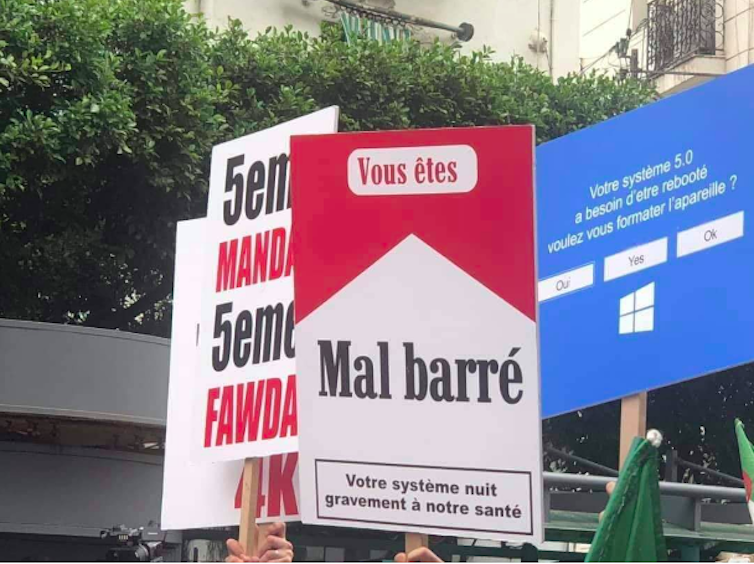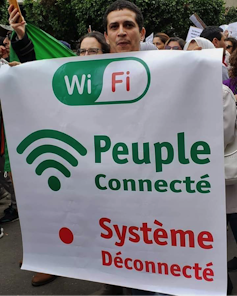Nacima Ourahmoune, Kedge Business School
Algerian citizens protesting against their president, Abdelalziz Bouteflika, have been heard. The 82-year-old politician officially announced on March 11 that he will not run for a fifth term and that presidential elections, initially planned for April 18, will be postponed.
For more than two weeks Algerians from all ages and social backgrounds protested peacefully calling for an end to Bouteflika’s regime. He has been sick and silent for years, and protesters dismissed his capacity to rule.
Bouteflika has been ruling since April 1999, and many of those now protesting against him have never been able to demonstrate before. Political protests were banned and repressed during the bloody decade of the 1990s because of terrorism and the state of emergency that followed.
With 45% of the Algerian population under the age of 25, young people who’ve taken to the streets to protest in 2019 never experienced such a regime. In their nonviolent protests, they used technology and diverted popular iconic brands and advertising slogans to raise awareness of their calls for a fresh set of political leaders.
Positive messages flooding the web
Algerian millennials thrive on positive messages. They flooded the web with images of young demonstrators kissing, handing flowers to police officers and women on international women’s day, distributing water bottles, volunteering for first aid or encouraging people to clean the streets after the demonstrations. This galvanised Algerians’ pride, and surprised many who know little about a country that has largely remained closed to tourism.
Their actions during the protests were in stark contrast to the past regime. They’ve been eager to emphasise the difference between their open-mindedness and aspirations for change and the symbolic closure of the country.
Whenever spontaneity was muzzled – on national television for instance – young people retaliated by staging debates in the streets that respected the diversity of opinions.
Many have criticised the country’s millennials for “being asleep”, embittered by the lack of prospects in Algeria and obsessed with an European Eldorado. Yet, their attachment to the country, and their refusal to destroy public spaces during the protests showed how strongly they feel about the future of their country.
‘Only Chanel can be N°5’
They may not yet have much access to employment, but the protesters showed real creativity during the demonstrations. Local media headlines called it a “renaissance” of the Algerian nation.
Humour became a central weapon of their resistance, crossing borders thanks to the hyper connectivity of the millennial protesters.
Young people who often dream of wider access to global markets, used iconic brands, films and series as political resources. For example, memes hijacking the iconic taglines of Marlboro advertising went viral, such as: “You are in a bad shape (‘Mal Barré’), your system is seriously damaging our health.”

Another sign imitated the black and white typography of an iconic Chanel perfume advert to poke fun at Bouteflika’s attempts to run for a firth term. It read: “Only Chanel can be N°5.” Another sign shouted: “Look at your Rolex, it’s time to go.”

The YouTube logo became “YouNamar” for “Y’a en a marre” (“We have enough”), while other signs imitating Wifi adverts claim: “Connected people, disconnected system.” Elsewhere, a mock-up of a Microsoft message claimed “Your 5.0 system needs to be rebooted”, while another poster showed a computer folder struggling to install “democracy in Algeria”.
These messages serve two main purposes for the young Algerians. They know they are being watched, within the country and outside it. By using such references they insist that while they feel estranged from Algeria’s current regime, they aspire to radically change it.
A strong connection to the world
The Algerian regime underestimated young people’s ability to mobilise online. The older generations had lived through an era with a single, socialist party system, product shortages and the absence of global brands.
But over the past few decades, today’s young people have grown up with access to an increased number of imports of international brands into Algeria which have brought with them new ideologies. This mass of global reference points have shifted the aspirations of young people.
At the same time, young political leaders have emerged in countries where Algerians have relatives, such as Justin Trudeau in Canada, Barack Obama in the US or Emmanuel Macron in France. Such phenomena acted as powerful catalysts and motivation for change, connecting them to the wider world, which they feel they have been shut out from for years.
While Algerian millenials seek this global connection to millennials elsewhere, my research shows that the mechanisms involved are not simply about absorbing a global culture and erasing Algerian culture. Rather, it’s a complex relationship, that hasn’t yet descended into aggressive nationalism.
For example, a recent study published with my colleagues explained how the iconic, century-old Algerian soda brand, Hamoud Boualem, competes with the Coca-Cola brand which appeared in the Algerian market much later. Yet the competition between the brands didn’t divide consumers between factions of hardcore nationalists and staunch lovers of America. Consumers appreciate the heritage of their Algerian soda, without condemning the American giant.
The awakening of Algeria
The behaviours and consumption patterns of young Algerians demonstrate how they’ve become accustomed to a globalised world, but at the same time take pride in Algerian society, free from the burden and influence of the global North.
Diverting brand slogans to demand democratic freedom is part of the same phenomenon: love for the country, pride and a sense of autonomy and responsibility. The recent demonstrations have shown how young people have invented their own style of protest with humour and pacifism, a way of claiming it can also reinvent its own society.
An inscription on an Algiers wall expressed it really well:
For the first time I don’t want to leave you, my Algeria.
And using humour, another poster condemned any attempt at interference from the US.
Dear USA there is no more oil left. Please stay away unless you want olive oil.
Such acts also show that young Algerians are not only aware of their history but also know how to capture the essence of it, to twist it and turn it into a new form of Algerian identity.
Young Algerians have just shaken up an entire country. Let’s now hope that they can translate their energy into real political change.
Nacima Ourahmoune, Professeur Associé / Chercheur/ Consultant en marketing et culture de consommation, Kedge Business School
This article is republished from The Conversation under a Creative Commons license. Read the original article.
